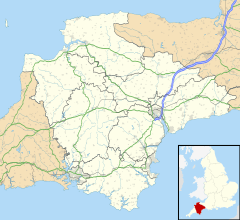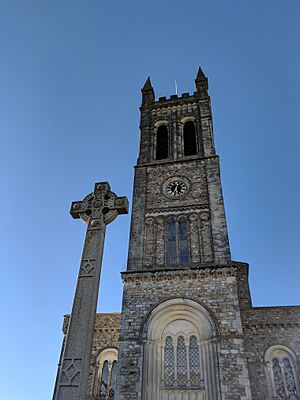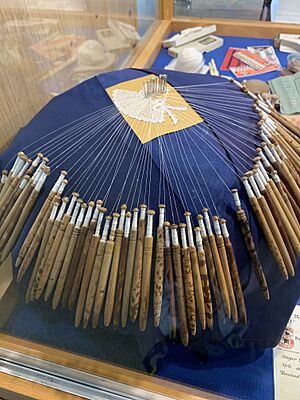Honiton facts for kids
Quick facts for kids Honiton |
|
|---|---|
 Honiton |
|
| Population | 12,154 (2021) |
| OS grid reference | ST164004 |
| Civil parish |
|
| District |
|
| Shire county | |
| Region | |
| Country | England |
| Sovereign state | United Kingdom |
| Post town | HONITON |
| Postcode district | EX14 |
| Dialling code | 01404 |
| Police | Devon and Cornwall |
| Fire | Devon and Somerset |
| Ambulance | South Western |
| EU Parliament | South West England |
| UK Parliament |
|
Honiton is a lively market town and civil parish in East Devon, England. It's located near the River Otter, about 17 kilometers (10.5 miles) northeast of Exeter in the county of Devon. In 2021, Honiton had an estimated population of 12,154 people.
Contents
Honiton's Past
Honiton grew up along the Fosse Way, an ancient Roman road. This road connected Exeter (which the Romans called Isca Dumnoniorum) to Lincoln (Lindum). Honiton was an important stop along this route.
The town is mentioned in the Domesday Book as Honetone. This name means "Huna's tun" or "Huna's farmstead."
Famous Lace Making
Honiton became well-known for its beautiful lace. This skill was brought to the town by people from Flanders during the Elizabethan period. In the 1600s, thousands of people made lace by hand in their homes.
Later, in the 1800s, Queen Victoria even had her wedding dress made with Honiton lace. The dress itself was created in the nearby fishing village of Beer. Honiton also became famous for its unique pottery.
Fires and Rebuilding
Sadly, Honiton was largely destroyed by a big fire in 1765. After this, many new Georgian-style houses were built. These new buildings replaced the ones that had been lost in the fire.
Important Buildings in Honiton
Most of the buildings on Honiton's High Street are in the Georgian style. They were built after two major fires in 1747 and 1765.
Churches in Honiton
St Michael's Parish Church is located on a small hill above the town. The church was rebuilt in 1911 after a fire. Only the west tower and the outer walls remain from the original old building.
St Paul's Church was designed by Charles Fowler in the mid-1800s. It stands in the center of town. This church was built between 1837 and 1838. Its style includes parts of Romanesque design, with tall columns and pinnacles on the tower.
Honiton's Museum
The Allhallows Museum of Lace and Local Antiquities has one of the best collections of Honiton lace in the world. The museum is in a building that is said to be the oldest still standing in Honiton. This building used to be part of Allhallows School from the 1500s until the 1930s.
Honiton's Culture and Traditions
Honiton has some interesting traditions and events.
Honiton Hot Pennies Ceremony
In 1221, Honiton received a special permission from King Henry III to hold a market. To celebrate this, the town started the Honiton Fair.
A unique tradition called the Hot Pennies ceremony still happens every year on the High Street. At noon, the Town Crier, along with the Mayor and other important local people, raises a special pole. This pole has a gloved hand at the top. The Town Crier then announces that "The glove is up. No man may be arrested until the glove is taken down." This meant that during the fair, people couldn't be arrested for money they owed.
After the announcement, pennies are thrown from balconies along the High Street to the crowds below. In the past, these pennies were sometimes hot, which could cause burns! People soon learned to wear gloves or use a cloth to pick them up. The pole stays on display for the whole "fair week."
Honiton Agricultural Show
Honiton also hosts the annual Honiton Agricultural Show. This event has been taking place since 1890. It's traditionally held on the first Thursday of August in fields near the town.
Education in Honiton
Honiton has two primary schools: Honiton Primary School and Littletown Primary School. For older students, there is Honiton Community College, which also has a sixth form for students aged 16-18.
Media and News
Local news and TV shows for Honiton are provided by BBC South West and ITV West Country.
You can listen to local radio stations like BBC Radio Devon (103.4 FM), Heart West (103.0 FM), and East Devon Radio (94.6 FM). The town also has a local newspaper called the Midweek Herald, which comes out on Wednesdays.
Getting Around Honiton
Honiton is an important meeting point for several main roads.
Roads
The town is where the A35, the A30, A373, and A375 roads all meet. The A30 now goes around the town, which helped reduce traffic jams after it was built in 1966. Honiton is about 13 miles (10.5 miles) from Junction 28 of the M5.
Trains
Honiton railway station is on the West of England Main Line. You can catch South Western Railway trains from here to London Waterloo and Exeter St Davids.
Buses
Stagecoach provides regular bus services from Honiton to places like Sidmouth, Ottery St Mary, and Exeter. There are also limited services to Seaton, Devon. Dartline operates the town's local bus service and some routes to Taunton and additional services to Seaton.
Air Travel
Exeter Airport is about 13 miles away from Honiton, making it easy to travel by air.
Twin Towns
Honiton is connected to two other towns in different countries:
- Mézidon-Canon in France
- Gronau (Leine) in Germany
Famous People from Honiton
Many interesting people have connections to Honiton, including:
- Rose Dugdale
- Samuel Graves: An Admiral in the Royal Navy
- Ozias Humphry: A well-known artist
- Alfred Leyman: An artist
- Jo Pavey: A famous athlete
- Juanita Maxwell Phillips: She was the mayor of Honiton eleven times in the mid-1900s.
- William Salter: An artist
- Maurice Setters: A professional footballer
- George Blagdon Westcott: A Captain in the Royal Navy
- Graham Loud: A professor of medieval history
See also
 In Spanish: Honiton para niños
In Spanish: Honiton para niños
 | Jackie Robinson |
 | Jack Johnson |
 | Althea Gibson |
 | Arthur Ashe |
 | Muhammad Ali |





